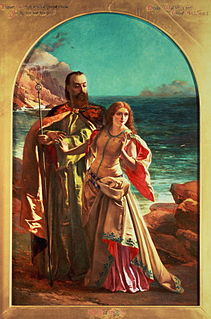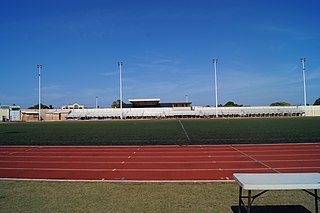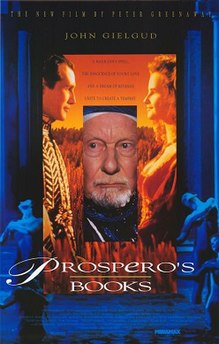
Prospero is a fictional character and the protagonist of William Shakespeare's play The Tempest. Prospero is the rightful Duke of Milan, whose usurping brother, Antonio, had put him to sea on a "rotten carcass" of a boat to die, twelve years before the play begins. Prospero and Miranda had survived and found exile on a small island. He has learned sorcery from books, and uses it while on the island to protect Miranda and control the other characters.

Return to the Forbidden Planet is a Jukebox musical by playwright Bob Carlton based on Shakespeare's The Tempest and the 1956 science fiction film Forbidden Planet. It was billed as "Shakespeare's forgotten rock and roll masterpiece".
Caliban, son of the witch Sycorax, is an important character in William Shakespeare's play The Tempest.

The Prospero satellite, also known as the X-3, was launched by the United Kingdom in 1971. It was designed to undertake a series of experiments to study the effects of space environment on communications satellites and remained operational until 1973, after which it was contacted annually for over 25 years. Although Prospero was the first British satellite to have been launched successfully by a British rocket, the first British satellite placed in orbit was Ariel 1, launched in April 1962 on a U.S. rocket.

Guillermo Prospero Trinidad Stadium is a multi-purpose stadium in Oranjestad, Aruba. It is Aruba's National Stadium, named after Guillermo Trinidad, a politician from the same neighbourhood (Dakota). Originally the stadium was named after former Dutch Queen Wilhelmina, but the name was changed in 1994 after the renovations were completed. The stadium hosts soccer matches and also track and field competitions. It has a capacity of approximately 3,000 spectators. Sinbad performed his HBO comedy special "Nothin' but the Funk" here in 1997.

Miranda is one of the principal characters of William Shakespeare's The Tempest. She is the only female character to appear on stage during the course of the play and is one of only four women mentioned.
Prospero is the protagonist of The Tempest, a play by William Shakespeare.

Prospero's Books is a 1991 British avant-garde film adaptation of William Shakespeare's The Tempest, written and directed by Peter Greenaway. John Gielgud plays Prospero, the protagonist who provides the off-screen narration and the voices to the other story characters. Stylistically, Prospero's Books is narratively and cinematically innovative in its techniques, combining mime, dance, opera, and animation. Edited in Japan, the film makes extensive use of digital image manipulation, often overlaying multiple moving and still pictures with animations. Michael Nyman composed the musical score and Karine Saporta choreographed the dance. The film is also notable for its extensive use of nudity, reminiscent of Renaissance paintings of mythological characters. The nude actors and extras represent a cross-section of male and female humanity.

The Masque of the Red Death is a 1964 horror film directed by Roger Corman and starring Vincent Price. The story follows a prince who terrorizes a plague-ridden peasantry while merrymaking in a lonely castle with his jaded courtiers. The screenplay, written by Charles Beaumont and R. Wright Campbell, was based upon the 1842 short story of the same name by American author Edgar Allan Poe, and incorporates a subplot based on another Poe tale, "Hop-Frog'". Another subplot is drawn from Torture by Hope by Auguste Villiers de l'Isle-Adam.
The Tempest is an opera by English composer Thomas Adès with a libretto in English by Meredith Oakes based on the play The Tempest by William Shakespeare.
La Traversée de Paris(The Crossing of Paris) is an album by the Michael Nyman Band featuring music composed by Michael Nyman for an audio-visual exhibition of the same name which took place at the Grande Arche de la Défense from July to December 1989 to celebrate the bicentennial of the French Revolution.

The Tempest is a 1979 film adaptation of William Shakespeare's play of the same name. Directed by Derek Jarman, with Heathcote Williams as Prospero, it also stars Toyah Willcox, Jack Birkett and Helen Wellington-Lloyd from Jarman's previous feature, Jubilee (1977), as well as his long-time cohort Karl Johnson.

Sycorax is an unseen character in William Shakespeare's play The Tempest (1611). She is a vicious and powerful witch and the mother of Caliban, one of the few native inhabitants of the island on which Prospero, the hero of the play, is stranded.
Gonzalo is a fictional character in William Shakespeare's The Tempest.

Ariel is a spirit who appears in William Shakespeare's play The Tempest. Ariel is bound to serve the magician Prospero, who rescued him from the tree in which he was imprisoned by Sycorax, the witch who previously inhabited the island. Prospero greets disobedience with a reminder that he saved Ariel from Sycorax's spell, and with promises to grant Ariel his freedom. Ariel is Prospero's eyes and ears throughout the play, using his magical abilities to cause the tempest in Act One which gives the play its name, and to foil other characters' plots to bring down his master.
Ferdinand is the prince of Naples and the son of Alonso, the King of Naples, in Shakespeare's play, The Tempest. He falls in love with Miranda. He is quick to promise the title of queen and wife to Miranda even though he doesn't know her name. He is happy in humble labours, blinded by love. He makes a solemn vow to be truthful to Prospero, and not to violate Miranda's chastity before their wedding.

The Tempest is a play by William Shakespeare, probably written in 1610–1611, and thought to be one of the last plays that Shakespeare wrote alone. After the first scene, which takes place on a ship at sea during a tempest, the rest of the story is set on a remote island, where the sorcerer Prospero, a complex and contradictory character, lives with his daughter Miranda, and his two servants — Caliban, a savage monster figure, and Ariel, an airy spirit. The play contains music and songs that evoke the spirit of enchantment on the island. It explores many themes including magic, betrayal, revenge, and family. In act four, a wedding masque serves as a play-within-the play, and contributes spectacle, allegory, and elevated language. Though The Tempest is listed in the First Folio as the first of Shakespeare’s comedies, it deals with both tragic and comic themes, and modern criticism has created a category of romance for this and others of Shakespeare’s late plays. The Tempest has been subjected to varied interpretations—from those that see it as a fable of art and creation, with Prospero representing Shakespeare, and Prospero’s renunciation of magic signaling Shakespeare's farewell to the stage, to interpretations that consider it an allegory of European man colonizing foreign lands.
Une Tempête is a 1969 play by Aimé Césaire. It is an adaptation of Shakespeare's The Tempest from a postcolonial perspective. The play was first performed at the Festival d'Hammamet in Tunisia under the direction of Jean-Marie Serreau. It later played in Avignon and Paris. Césaire uses all of the characters from Shakespeare's version, but he specifies that Prospero is a white master, while Ariel is a mulatto and Caliban is a black slave. These characters are the focus of the play as Césaire foregrounds issues of race, power, and decolonization.

The Enchanted Island is a pasticcio (pastiche) of music by various baroque composers, including George Frideric Handel, Antonio Vivaldi, and Jean-Philippe Rameau, devised and written by Jeremy Sams after The Tempest and A Midsummer Night's Dream by William Shakespeare. It was created by Julian Crouch and Phelim McDermott and premiered by the Metropolitan Opera on December 31, 2011, starring David Daniels, Joyce DiDonato, Danielle de Niese, Luca Pisaroni, and Lisette Oropesa. The popular 70-year-old Spanish tenor, Plácido Domingo, played the small but important part of the sea god Neptune. The following month a performance of the pasticcio was broadcast live into movie theaters across the world as part of the Metropolitan Opera Live in HD series. In late 2012, Virgin Classics released this broadcast version on DVD. The Met revived The Enchanted Island two seasons later. Daniels, de Niese, Pisaroni, and Domingo revived their roles from the premiere. Susan Graham assumed the role of Sycorax from DiDonato.

The Tempest, also known as The Tempest , or simply Prospero and Miranda, is an outdoor bronze sculpture depicting Prospero and Miranda from William Shakespeare's The Tempest by Milton Hebald, installed outside Delacorte Theater in Manhattan's Central Park, in the U.S. state of New York. The work, which was gifted by George T. Delacorte, Jr. and unveiled in 1966, is a companion piece to Romeo and Juliet (1977).


















